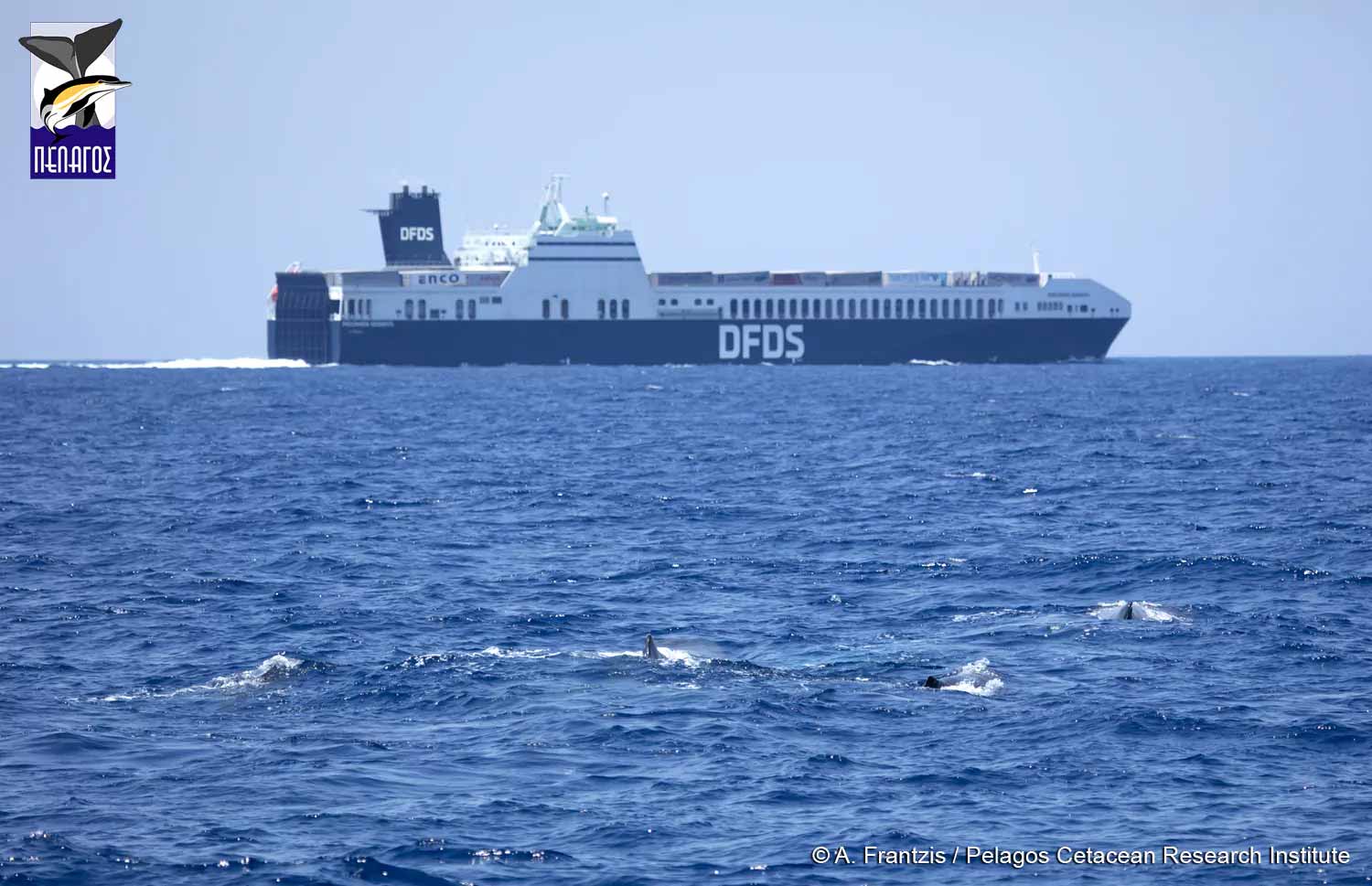Major Danish shipping company strives for a brighter future for endangered sperm whales in Greek waters
One of the largest shipping companies in Europe, DFDS, will alter their routes and slow down to reduce the risk of collisions with endangered sperm whales in the Eastern Mediterranean Sea. The planned changes should halve the risk of DFDS ships colliding with sperm whales in the areas west of the Peloponnese.
The Danish-based company has taken this action in response to scientific advice from a coalition comprising the research and conservation groups IFAW (International Fund for Animal Welfare) OceanCare, the Pelagos Cetacean Research Institute and WWF Greece. Long-term data gathered by the coalition show that if all ships avoided the areas of highest risk, the overall risk of sperm whale collisions would be reduced by 70%.
The company will with immediate effect make changes to a number of its shipping routes and will also travel at slower speeds when crossing through core sperm whale habitat in the Hellenic Trench, off the coast of Greece.
It is estimated that there are now only around 200 sperm whales remaining in this area, with the population now classified as endangered. Sperm whales are the largest toothed whale species, and the most serious threat to their survival in these waters is the risk of being struck by large and fast-moving ships.
«Sperm whale numbers have been on a worrying decline for some time. By making these small but important changes, a brighter future for them lies ahead. Much like people trying to cross a busy road, whales are faced with crossing high traffic routes with fast moving ships – many are killed as a result,» the coalition said. «There have been significant challenges for the company to overcome and while certain restraints remain, their commitment and dedication to act has been impressive. The measures taken will significantly reduce the risk of their ships colliding with sperm whales».
«This is important progress, bringing hope against the dire projections that sperm whales will vanish from the area in coming years,» the coalition continued. «But the risk is by no means gone, and urgent action is still needed. We have the collective power to save these whales from extinction and we urge other ship operators to also make science-based decisions to re-route, and help secure the future of sperm whales in the Eastern Mediterranean».
DFDS is the largest operator of some of the fastest- moving vessels in the Hellenic Trench area – an area starting from the Greek Ionian islands to the southwest of Crete which is a critical habitat for protected and endangered species of cetaceans. DFDS’ ships cross the main sperm whale habitat more than 1,600 times a year, and almost 70% of these journeys pass through the main area of concern. The risk of collisions with whales increases rapidly with increasing ship speed. Currently, DFDS vessels are some of the fastest in the area and comprise 48% of the ship traffic travelling at speeds greater than 17 knots.
The commitment by DFDS, coupled with the re-routing measures implemented by other shipping companies working with the coalition, result in the total collision risk to sperm whales in the Hellenic Trench being cut by an estimated 27%.
Background
- The measures that will now be taken by DFDS involve a combination of changes in route and slower speeds. These changes have been designed to optimise the reduction in risk while taking into account the operational requirements of ships running to tight schedules. They are a result of close collaboration and dialogue between DFDS and scientists assessing the ship strike risk, allowing a range of possible options to be considered and evaluated.
- Information about the main areas of risk to sperm whales has been issued in Notices to Mariners by the Hellenic Hydrographic office. More recently, this has also been included in the Admiralty Sailing Directions issued by the United Kingdom Hydrographic Office that are used by the majority of international shipping. The coalition welcomes these positive steps towards raising awareness and official recognition of the problem and will continue working to encourage all shipping companies to adjust their routes.
- Sperm whales (Physeter macrocephalus), well known from the legendary tale Moby Dick, belong to the group of toothed whales and can dive to around 2000 metres. Outside of the Mediterranean, sperm whales are listed as ‘Vulnerable’, but due to its small size and geographic isolation, the Mediterranean population is listed as ‘Endangered’ on the IUCN Red List of Threatened Species.
- The Pelagos Cetacean Research Institute has been studying the eastern Mediterranean sperm whale population since 1998. These studies have identified the Hellenic Trench, to the west and south of the Peloponnese and west and south of Crete, as critical habitat for these whales. These deep-diving whales are found here year-round – the only area where family groups have been observed in the eastern Mediterranean, and they concentrate around the 1000m depth contour – directly in the path of busy shipping routes.
- The Agreement on the Conservation of Cetaceans of the Black Sea, Mediterranean Sea and contiguous Atlantic area (ACCOBAMS) recognises the Hellenic Trench as one of five high-risk areas where ship strikes often occur with endangered whales, and calls on Greece to implement mitigation measures as a matter of urgency.
- The Hellenic Trench is also recognised as an Important Marine Mammal Area (IMMA) by the International Union for Conservation of Nature (IUCN) SSC-WCPA Marine Mammal Protected Areas Task Force, underscoring that the area should be prioritised for conservation measures to protect vulnerable whales.
- A number of shipping companies such as MSC Mediterranean Shipping Company, and Euronav, are now instructing their vessels to avoid the high-risk areas by altering their routes, as a result of the coalition’s outreach. Moreover, key industry associations such as the German Ship Owners Association (VDR) and the International Chamber of Shipping (ICS) are encouraging their members to undertake similar actions.
Photo: Pelagos Research Institute
